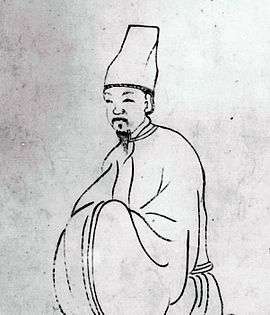Hong Daeyong
| Hong Daeyong | |
|---|---|
 Portrait by Um-Sung | |
| Born |
12 May 1731 South Chungcheong Province, Joseon |
| Died |
17 November 1783 (aged 52) Hanseong, Joseon |
| Cause of death | Stroke |
| Nationality | Joseon |
| Other names | Damheon |
| Notable work | Books of Relaxed House |
| Era | 18th-century philosophy |
| Region | Korean Confucianism |
| School | Silhak |
Notable ideas | Earth's rotation, Anti-Anthropocentrism |
|
Influences
| |
|
Influenced
| |
Hong Daeyong (Hangul: 홍대용; Hanja: 洪大容; 12 May 1731 – 17 November 1783), styled Damheon (Hangul: 담헌; Hanja: 湛軒, "Relaxed house") was a philosopher, astronomer and mathematician of the late Joseon Kingdom. Hong was an early leader of the Profitable Usage and Benefiting the People (Hangul: 이용후생파; Hanja: 利用厚生派; RR: Iyong Husaeng-pa) school of thought. It worked to promote the industrialization of his country and the development of trade by positively introducing Western technologies to Joseon Korea. Hong was a friend of Park Ji-won, who was another leader of the Profitable Usage school.[1]
Early life
Hong Daeyong was born in 1731 in Cheonan, South Chungcheong Province. In his early days, Hong was educated by Kim One-hang of Seock-sil Seowon. During this period, traditional Neo-Confucianism formed the basis of his academic world. In 1765, Hong followed his uncle Hong Eock(Hangul: 홍억; Hanja: 洪檍), who was in Joseon missions to Imperial China. In China, Hong witnessed a brilliant development of Qing Dynasty and experienced culture shock. After returning to Joseon, Hong insisted enhancing the national prosperity.
Astronomy
Hong was also interested in astronomy and mathematics. He maintained the rotundity of the Earth and Earth's rotation. Traditional Confucianists regard that the sky is globular and the ground is square so they couldn't understand Hong's idea. Also, He firmly excluded the Anthropocentrism. Hong thought all things in nature are equal.
After being failed Imperial examination (a kind of examination for the high civil service) a few times, Hong gave up examination and was absorbed in astronomy research. He wrote Catechism of Eusan mountain(Hangul: 의산문답; Hanja: 醫山問答), which contains the concepts of Earth's rotation and the equality among species and the infinity of outer space. In mathematics, Hong wrote Interpretation and Usage of Mathematics(Hangul: 주해수용; Hanja: 籌解需用). And he wrote Travel Essay of Yanjing in 1765 and 1766(Hangul: 을병연행록; Hanja: 乙丙燕行錄), a travel journal about his China travel.
Crown Prince
In 1774, Hong was recommended for a mentor of Crown Prince, who afterwards would be King Jeongjo. Hong discussed many topics and themes with crown prince. Although Crown Prince was satisfied with Hong's studies and polymathy, Hong found their difference of views among several topics and the conservatism of Prince. Crown prince demanded Hong to go into government service and be his own staff members, but Hong indicated his refusal in a roundabout way. Hong wrote Journal as the Mentor of Crown Prince(Hangul: 계방일기; Hanja: 桂坊日記), which contains their debate contents.
After crown prince ascended the throne following the passing of the King Yeongjo, Hong was appointed to local county governor. In there he tried to test his progressive ideas in local society. However, his mother's health condition deteriorated in 1782, so Hong abandoned a service and came back to Seoul. In 1783, mother regained her health, but Hong had a sudden stroke. He wouldn't make it by morning, and breathed his last breath the next day. It was 23 October 1783(Lunisolar calendar) as 17 November 1783(Solar calendar).
Works
Hong's works, including Catechism of Ui mountain, Interpretation and Usage of Mathematics, Journal as the Mentor of Crown Prince were compiled to collection, Books of Relaxed House (Hangul: 담헌서; Hanja: 湛軒書). His practical Confucian ideas were succeeded by Park Ji-won and Park's disciples, but his scientific thought and research were succeeded by nobody.
References
- ↑ "Hong Daeyong(洪大容)". Encyclopedia of Korean Culture (in Korean). Retrieved 2018-06-17.
External links
| Wikisource has original text related to this article: |
- (in Korean) Books of Relaxed House
- (in Korean) Catechism of Ui Mountain
- (in Korean) Journal as the Mentor of Crown Prince